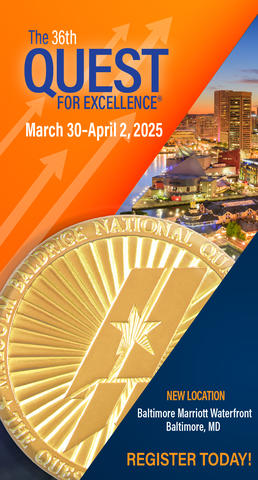Blogrige
The Official Baldrige Blog

Shola Richards, Opening Keynote speaker, 35th Baldrige Quest for Excellence® Conference
Imagine a workplace of happiness and engagement. What does that look like?
Shola Richards, the CEO and founder of Go Together Global™, said leaders will need a “resilience mindset” to guide their teams to that workplace, where individuals—and organizations—are able to “bounce back” even stronger from challenges and disruptions.
At the Baldrige Program's upcoming, 35th Quest for Excellence® Conference, Richards, who is the author of Making Work Work and Go Together, will present the keynote address “Unstoppable Resilience™: The Keys to Staying Strong During any Challenge” to help leaders “build unshakable strength within themselves and within their teams.”
Drawing on his experience as “an authority on workplace happiness and engagement,” Richards plans to inspire the Quest audience with practical tools to build resilience and “a sprinkle of inspiration to share with your teams and model yourself as leaders . . . to make significant differences in how [you] work, live, and lead.”
Individual and Organizational Resilience
Richards defines resilience as the ability to bounce back quickly from difficult or unpleasant circumstances; for organizations, this could mean bouncing back from natural disasters, economic downturns, supply-chain challenges, and, most recently, global pandemics. For individuals, it is about having “a resilience mindset.”
“Organizations that are able to bounce back from challenging circumstances will be made up of individuals who are balancing their own resilience challenges,” he said. “The idea is to make sure the individual is strong so that he or she can pair up with other strong individuals to ultimately build strong organizations.”
Facing the Coming Challenges
In 2024, leaders will need to be willing to do hard things, Richards said, but the challenge is how to do the hard things a little bit better. Talent management, diversity, and a culture of psychological safety will be key, he said.
Talent management, with the ability to attract and retain great talent, is going to be a differentiator for resilient organizations going forward, said Richards. High-performing staff members will have many options and opportunities to move to more agile organizations that meet their needs.
“If you’re operating in the same way that you did in 2019, that is not going to be attractive to the best talent,” said Richards. “Any organization that is serious about innovating, improving, and being the best will need to put a heightened focus on not just talent management but creating a high-performing culture . . . where folks are excited to be there and will tell others about their experience. They will want to stay longer, knowing that they will have the opportunity to grow and thrive and do their best work.”
In addition, Richards said that truly innovative companies embrace diverse perspectives. “They don’t just listen to the same people, get the same information. . . . [Companies] who successfully innovate are the ones that put themselves in uncomfortable situations, encourage thoughtful risk taking, and embrace diverse perspectives.”
“It comes down to being passionate about doing hard things and not wishing for things to get easier, because they probably won’t,” he said.
Drivers of Culture
The keynote theme of “unstoppable resilience” applies to leaders because they are the drivers of culture, creating an “environment of psychological safety” where people are able to communicate openly, “where they can raise their hand and say things like I don’t know, or I’m burned out, or I need help without the fear of being shamed for doing so,” Richards said.
In a culture without open communication, he said, people fear their promotability will be impacted if they speak honestly about their struggles. They may withhold information instead of sharing it, which could affect innovation and the ability to perform for customers.
“The first step for leaders is to make sure that they are creating an environment where people are able to do their best work,” he said.
Richards, whose background is in organizational psychology, said he often sees leaders who behave in a way that actually lessens the resilience of their organizations because they do not role model the right behaviors, he said.
"For leaders, modeling the right behaviors is one of the most important skills,” said Richards. "It may seem like an unnerving thought, but the people you’re entrusted to lead are always watching you. They’re observing if you are working, communicating, and leading in a way that strengthens the team, or weakens it.”
It all comes back to having a resilience mindset, Richards said.
“It’s the ability to bounce back from difficult circumstances even if that bounce back is small. It’s a step in the right direction, and that’s what I’m hoping to talk about at the conference.”
Join us at the Quest for Excellence® 2024!

The Quest for Excellence® Conference
Sunday, April 7–Wednesday, April 10, 2024 | #BaldrigeQuest
The conference will feature new and exciting opportunities to learn role-model best practices from nationally recognized thought leaders, Baldrige Award recipients, and representatives from other high-performing organizations. Conference highlights include sessions focusing on organizational resilience and future emerging challenges and take-home solutions to help your organization achieve breakthrough performance in areas such as leadership; strategy; customers; measurement, analysis, and knowledge management; workforce; and operations.





